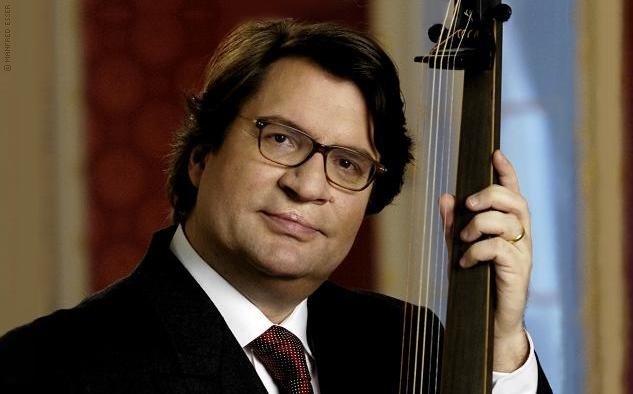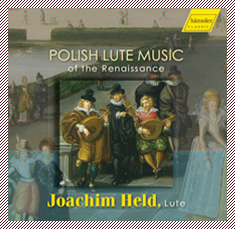 |
 |
|
|
Discography
Tracklisting Click here to launch our Audio Player
CD Information For this excellent CD of Polish renaissance lute music Joachim Held plays seven pieces by Albert Dlugoraj (1558-after 1618), eight by Diomedes Cato (1565-1628), nine by Jakub Polak (c.1545-1605), and seven anonymous pieces. The first track for each of the three named composers is a prelude, setting the mood for the dances and fantasias which follow. The dance pieces are quite short, ranging from a mere 31 seconds to 1'41", but the fantasias are more substantial. Track 12 is a Fantasia by Diomedes from Besard's Thesaurus Harmonicus (1603). It is a fine piece, and well sustained by Held, albeit skipping a low G (a6) just towards the end. Track 15 is an extraordinary fantasia, five minutes long, with interesting chromatic turns and a couple of bars towards the end which are reminiscent of Dowland's Semper Dowland Semper Dolens. The piece was the first to be included in Robert Dowland's anthology, Varietie of Lute Lessons (London, 1610). From the same source Held plays a fantasia by Polak (Track 31). Something seems to have gone wrong with the recording at bar 15, because some notes are missing. All the anonymous pieces are from D-B Danzig 4022. The first, and at 6'08" the longest, is an interesting set of variations on Monycha [=Monica] aka Une Jeune Fillette, which Held takes at an appropriately unhurried speed. I am less happy with his leisurely speed and use of rolled chords for Track 20, the well-known dance from folio 20v of Danzig 4022, which I feel needs a more sprightly, foot-tapping interpretation. Track 24 is a lively Volte by Polak, which has a clear 2-part texture (occasionally filled out to 3-part), with nice interplay between treble and bass. Held's brisk tempo is ideal, and he has contrasting loud and soft for the first section. Surprisingly he omits the first note of bar 9, but he does include three chords missing from the source (Lord Herbert of Cherbury's MS), which were inserted as bar 21 in Piotr Pozniak's edition. Most useful is a list of sources provided in the liner notes, so if you want to follow the score, or play the pieces yourself, you know where to look. I cannot find any information about the sort of lute Held plays for the present CD. There is an uncaptioned photo of an eight-course lute on page eight of the liner notes, but no information about it or its maker. I have always liked Held's playing. Unlike so many of today's lutenists, he eschews excessive rubato, and actually plays in time. He must have heeded the advice from the Johannes Nauclerus lute book, which he quotes in his liner notes: "And you must observe the beat, if you will court fair Maidens." I wish him luck with amorous activity. Stewart Mc Coy, early music review |
               |
| © Joachim-Held.com / All rights reserved / Disclaimer |
